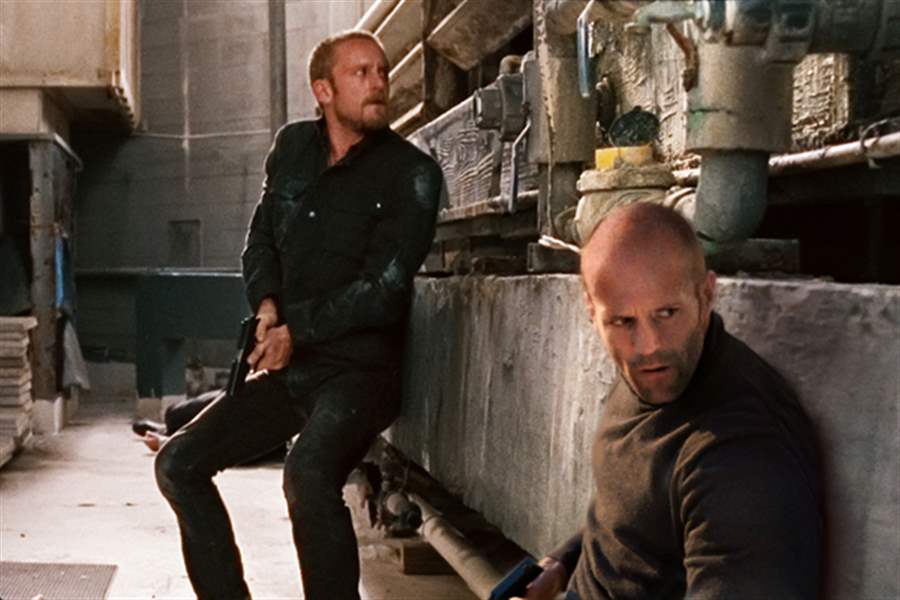
'Mechanic' retools '70s classic, takes it for a fun spin
1/27/2011
Ben Foster, left, plays the mechanic's protege Steve McKenna.
Patti Perret / AP
A mechanic, in some circles, is a hit man, a guy who fixes problems permanently.
Charles Bronson played one in 1972: Arthur Bishop, an emotionally aloof 44-year-old assassin who finds clever ways to dispatch his targets without the use of weapons. Bishop works for a mysterious organization that pays him to kill men in ways that don't call attention to the deaths -- acts of nature, ill health, or bad luck.
Bishop is a thinking-man's killer, which makes his violent acts -- from the meticulous planning to the cold-blooded execution -- fascinating. Riveting even. It's not a surprise that this gritty thriller gave tough-guy actor Bronson one of his best roles.
And it really shouldn't come as a surprise that, nearly 30 years after the original, a remake of The Mechanic arrives in movie theaters Friday. Unlike the spate of mostly needless Hollywood film regurgitations, this retooled Mechanic, while never necessary, is clever enough to remain largely faithful to the original in plot, and edgier in execution for today's audience.
Among the remake's biggest success is the cast. Jason Statham is the ideal replacement for Bronson. The chiseled action movie star is a man of even fewer words than Bronson, a trait that suits the Bishop character well.
Bishop is a strategist, a chess master in killing, who pores over every detail of his intended victim. He's also a man of culture with a penchant for classical music on vinyl, fine wine, and pricey modern art.
But Bishop opts to no longer go it alone.
He takes on a young protege, Steve McKenna, to help with the assignments. Depending on the film version, Steve is the ungrateful or screw-up son of one of Bishop's only friends, Harry McKenna. When Harry dies, Steve asks to join Bishop as a mechanic, not knowing that it was Bishop who killed his father on orders from the organization.

Ben Foster, left, plays the mechanic's protege Steve McKenna.
The 1972 version of The Mechanic featured a young, Southern California-handsome Jan-Michael Vincent in the Steve role. The remake casts Ben Foster (The Messenger, X-Men: The Last Stand) in the part. Both versions of Steve share an easy intoxication with killing and prove to be quick studies in the art of assassination. This is where the original and remake of The Mechanic diverge.
Vincent played Steve as a disillusioned twentysomething with no emotional attachments -- he hated his father and was content to watch his girlfriend bleed to death after slicing her wrists in a suicide attempt -- and no moral center. Clearly the '70s version of The Mechanic had sincere thoughts about youthful counter-culture and its rejection of all-things over 40.
Foster's Steve is a bit more emotionally complex, though he's introduced as the proto-slacker. It's not until his father's death that he has a purpose in life: avenge the murder he believes was a case of random carjacking. The updated mechanic also gives Harry (Donald Sutherland) more screen time. His and Bishop's relationship is more father-son than in the original film, which makes the assassination personal for Bishop.
Tony Goldwyn plays Dean, the head of the organization, a family man, we learn, with a vindictive streak. Bronson's Bishop never goes after the boss. In 2011, would audiences have it any other way? Such revenge tactics, though, take the film into the Chicago streets for noisy car chases and shoot-outs, all of which would be better served in a Grand Theft Auto game. Thus the two Mechanics beget endings that, while vaguely similar, offer sharp comparisons between '70s cinema fatalism vs. modern Hollywood's need to leave audiences happy.
Of the two versions of The Mechanic, I prefer the original. The decades-old film is dated by cars, clothes, colloquialisms, and technology, but the film has something to say. Its director and frequent Bronson collaborator, Michael Winner, fastened an intriguing comparison of clashing cultures and ages between the live-by-a-code ethics of Bishop with the "if it feels good do it" hedonism of Steve. The remake, directed by Simon West (Con Air, The General's Daughter) is more of a buddy film between two different personalities.
There's not a lot of depth to this remake. It's a fun ride -- mostly -- though just as easily forgotten.
Contact Kirk Baird at kbaird@theblade.com or 419-724-6734.